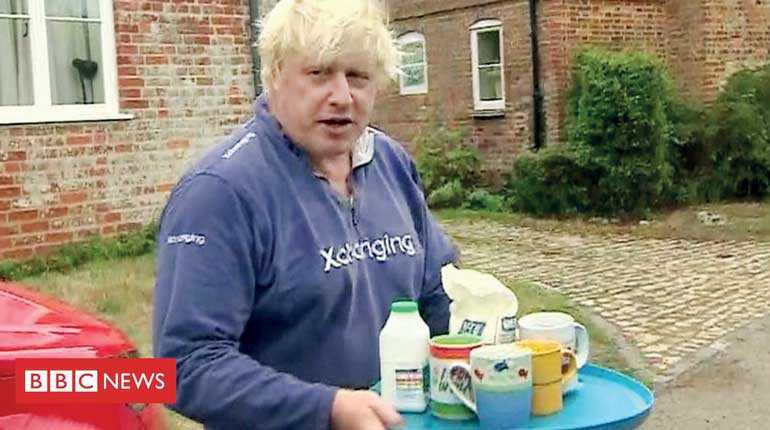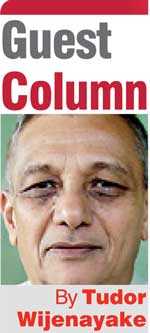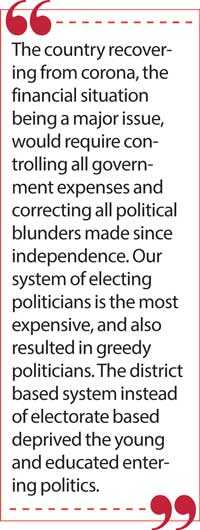Saturday Feb 21, 2026
Saturday Feb 21, 2026
Tuesday, 18 August 2020 00:10 - - {{hitsCtrl.values.hits}}

When British PM Boris Johnson recovered from coronavirus, journalists visited him. The news media presented an old BBC video film under ‘The former foreign secretary Boris Johnson offers tea instead of answers’
The 5 August election gave Sri Lanka Podujana Peramuna (SLPP) 145 seats out of 225 in parliament; only five seats short of 2/3rd majority required for a constitution amendment. SLPP seniors are confident of getting the required numbers, no surprise considering the nature of our politicians.

Financial problem
The biggest issue facing the country is the critical finances, local also foreign; a longstanding issue. The situation worsened with the corona crisis with crashing of garment exports and no tourist arrivals, forcing the payment of government staff salaries by the treasury with monies borrowed from state banks. Foreign loans are settled with further loans and the government is begging friendly countries to delay payment of loans. Garment exports and tourist arrivals are not expected to become normal at least for another year.
Getting rid of 19th Amendment
During the run up to elections a number of speakers spoke of the necessity to get rid of the 19th Amendment to the constitution, claimed to have reduced powers of the President and created issues. During the vote in April 2015, of the 225 members, 215 voted in favour, one against, one abstained and seven were absent, accepted the amendment. Meaning, practically entire parliament members voted in favour, including those wishing to remove same.
Also, the introduction of a 20th Amendment is being discussed, but details yet to be announced.
Deterioration of finances
When the British left, in terms of per capita income Ceylon was second only to Japan. In spheres such as education, health and infrastructure the country ranked either first or second among Asian countries. In addition the country had a good foreign exchange balance. But afterwards, the country had only two years of positive budgets and balance years expenses exceeded income. What Gotabaya inherited was the cumulative result over the decades.
Yahapalanaya period was the worst ever. Ranil increased staff salaries by Rs. 10,000 and wished to pay arrears with April salary, needed Rs. 40,000 each for 1.8 million staff. Getting the required funding led to the infamous bond scam. In February President Sirisena suspended funds to the Paddy Marketing Board to purchase paddy from Maha harvest. Without PMB private rice millers led by the President’s brother, purchased paddy offering much lower prices than PMB fixed Rs. 23. In April, paddy purchase price was revised to Rs. 43; by then private millers had purchased all paddy stocks. Resulting retail price of rice shot up from Rs. 45 to 50 to Rs. 75 to 85 and rice mill owners made enormous profits, while increasing cost of living.
Recovering from the situation
Recovering from financial issues would require reducing government expenditure in low productive areas and long term solutions, including:
a. Increase local production reducing imports
b. Lowering electricity power costs
c. Producing employable students and graduates
d. Reducing administrative costs
e. Lowering foreign representation
f. Making politicians honest
g. Amending election procedure
h. Lowering maintaining cost of politicians
a. Increase local production reducing imports
As an immediate solution, the government reduced imports including some food items, encouraging local cultivation. But local cultivators with small farmlands, demand high profits, claiming it is needed for survival of the family. In India onions and potatoes wholesale at around SLR 10 a kilo, our farmers demand near 10 times. Only northern farmers produce at reasonable costs. If their water problem is addressed, northerners would make the country self-sufficient in potatoes, onions, etc.
b. Lowering electricity power costs
The President’s program proposed by 2030, 80% of electrical energy be supplied from renewable sources as hydro, solar and wind power. Currently, CEB’s electricity production costs around Rs. 23.50 per unit, but sold at Rs. 18.50, loss of Rs. 5 per every unit sold.
Solar and wind power technology has improved dramatically over the past few years reducing costs. At the solar power tender closed few weeks ago for 1-10 MW of power, most tenderers quoted around Rs. 10 per unit, some lower. If CEB accepts the tenders, signs contracts and power purchase agreements early, power would be available in 18 months. But over the years CEB dragged the contract awards resulting in prices quoted being no longer applicable. In addition, large solar plants exceeding 100 MW could allow power around Rs. 6 per unit, showing the possibility of lowering costs. RE projects without government funding and eliminate fuel or coal that pollute atmosphere. In addition lower electricity costs would reduce manufacturing costs and encourage investors.
Solar power is available only during the day, but wind power is throughout the day and night, thus would help to balance power with solar. Thus solar, wind and hydro could supply our power needs supported by gas power plants.
Meanwhile, government has already approved extension of Norochcholai power plant by further 300 MW, which would make 80% RE by 2030 impossible, as the power plant has a 20-year lifespan. In addition, CEB has proposed installing a Floating Storage and Regasification Unit (FSRU) in Colombo’s North Container Terminal to supply gas to Kelanitissa power plant and the Kerawalapitiya where a new LNG power plant is to be built. The proposal with the possibility of a blast similar to Beirut where the entire city was devastated, thus the FSRU plant needs shifting to Kerawalapitiya.
c. Producing employable students and graduates
The country offers free education, but employment opportunities to students completing education and the graduates is a major problem. When the distance education was introduced during the lock-down, need of IT and English got highlighted. Thus students require English based education for future employment.
Majority of graduates passing out from universities are Arts based and cannot find employment. The President promised jobs to 45,000 graduates, overloading the overstaffed government service. They need be given six months paid leave to become teachers in mathematics, science and English in English medium, fulfilling teacher shortage. When the policy is announced, institutions to teach would appear overnight. Also the education in universities needs major revision to produce employable graduates, a task for the new Minister of Education.
d. Reducing administrative costs
The government has already cut down over-time in institutions. But a large number of state owned enterprises exist without performing any useful activity, filled with staff. They depend on the treasury every month to pay the salaries, rent of buildings, electricity and water bills, fuel and maintenance of vehicles. These institutions need closing down and the staff be given a lump sum payment. As the treasury is short of funds the payment could be part cash, also bonds encashable in 3, 5 and 10 years.
e. Lowering foreign representation
The country is represented internationally with embassies and representatives in practically every country, while our trade and contacts are almost zero. The corona pandemic with travel and trade restrictions made matters worse. To save foreign exchange, embassies in a number of countries could be closed down or staff reduced.
f. Making politicians honest
According to the 19th Amendment “Clause 2, 14A. (1) Every citizen shall have the right of access to any information.” Every contestant to parliament elections is expected to declare assets and liabilities, but what happens if details are not provided? According to law the declaration is available to public on a payment, but the document is for your eyes only and cannot be shown to anyone or discussed. How fair is the legislation?
g. Amending election procedure
Our elections procedure is extremely cumbersome and expensive, needs amending election procedure, reduce parliament member numbers, minister numbers and payments made to MPs and ministers.
The current form of elections introduced by J.R. Jayawardena in 1978, superseded the first-past-the-post system existed since independence. The electorate was replaced by the district, depriving the citizens of a MP for the electorate.
Last election with restrictions on meetings and posters, only rich could reach the voters. Voters were presented with a large ballot paper, but were not educated in advance. This resulted in 744,373 rejected votes, comparatively presidential elections had only 135,452. The rejected numbers exceeded the total votes received by TNA (327,188), UNP (249,000) and SLMC (34,428). Thus showing a serious defect in the election process depriving rights of the voter. The expensive system failed and needs reverting back to first-past-the-post system.
f. Lowering maintaining cost of politicians
Our parliamentarians are referred to as honourable members of parliament, and are expected to deliver an honourable service.
Constitution “Article 68: Allowances of Members
(1) Ministers, Deputy Ministers and Members, including the Speaker, the Deputy Speaker and the Deputy Chairman of committees, shall be paid such remuneration or allowance as may be provided by Parliament, by law or by resolution, and the receipt thereof shall not disqualify the recipient from sitting or voting in Parliament.”
Our MPs and the Ministers are paid moderate salaries from Rs. 54,000 to 65,000 a month. But with various allowances totals exceed Rs. 600,000 a month, including an office allowance of Rs. 100,000, two phones at Rs. 50,000 each, Rs. 350,000 for postage and others.
In addition MPs are given vehicle permits which they normally sell at a profit. The ministers are allowed six personal staff paid by the government, normally his family members. They too are allowed vehicle permits, making each minister getting seven permits, bringing massive profits. On completing five years they become entitled to pensions as well. Deputy Ministers and State Ministers too are considered as ministers in the award of vehicle permits. The Ministers are allowed five official vehicles and deputy ministers three with drivers, also a coordinating secretary with a petrol allowance of 218 litres. All on top of official residences and food in the parliament.
The new Cabinet includes 25 ministers, 40 deputies and in addition 23 members of District Coordination Committee (DCC). The DCC members are appointed from MPs, but their remunerations and allowances are unknown.
The parliament is given authority by the constitution to determine MPs salaries, allowances and perks without any checks and balances, which has been grossly misused. Thus the constitution need be amended to include checking and balancing by an independent authority. For the country to come out of its current financial mess, the President needs to reduce the allowances and withdraw vehicle permits issued to MPs, making them honourable. Then the administrative staff, who enjoyed similar privileges too would be forced to agree to reduce.
Parliament member numbers
When JR was elected under the 1972 constitution the parliament had 168 seats. Now the member numbers have risen to 225 with 29 nominated members and the seating had to be increased at a great cost. Do we require ever increasing numbers? Thus we need to go back to 168 seats with original electoral boundaries, could be revised with changes to population, with five nominated MPs if required.
Parliament minister numbers
The 1978 constitution as well as the 19th Amendment stipulate minister numbers be limited to 30 and deputies at 40. But in November 2014, the parliament included 108 ministers (cabinet, senior, deputy and state), also in January 2018 we had 96 ministers, but our vocal human rights groups failed to make a sound.
Our minister numbers when compared to most populous China with 25 ministers, USA has only 15, India having large number of languages 24, Japan 20, UK 26, Singapore 19, all with university degrees and 15 with post graduate qualifications. In our last parliament 96 members had failed to have O/L qualifications.
Our minister numbers need be reduced to 20 and deputies to 30 without provision to increase under various pretexts.
Boris Johnson
When British PM Boris Johnson recovered from coronavirus, journalists visited him. The news media presented an old BBC video film under ‘The former foreign secretary Boris Johnson offers tea instead of answers – BBC News’ available at https://www.youtube.com/watch?v=r799U_-jAnk.
The YouTube video refers to the PM when he was foreign secretary during 2016 to 2018, who used to travel to Parliament on a bicycle. After being appointed PM he wished to continue, but police objected on security issues.
The YouTube shows his old small house almost ready for demolition. He met visitors outside the house dressed in an old shirt and a pair of shorts. He offered tea to visitors made by himself in mugs, but each different. How many of our politicians even Provincial Councillors live and have a lifestyle as Boris Johnson?
Provincial Councils
JR government came under pressure from India to devolve power to north and east as in India. Resulting in the 13th Amendment to 1978 Constitution establishing the Provincial Councils Act No. 42 of 1987, passed by the parliament in November 1987. The first elections took place on 28 April 1988.
Today, some PCs have not functioned for nearly three years, but none complained of any problems showing the redundant nature of the entire system, established and run at an enormous cost. In addition, PC members too are eligible for vehicle permits.
Deleting PCs and addressing northern issues
If PCs are disbanded the Tamil population would lose some of their rights. For the moment PCs in the north and east can be left alone until Moragahakanda waters are delivered beyond Vavuniya. Moragahakanda project was planned to deliver water to the north receiving lowest rainfall. But politicians modified the project reducing water to the north, also delayed implementation. President Sirisena was interested only in the supply of water to Polonnaruwa covered by ancient irrigation schemes.
Mahinda Rajapaksa after accepting duties visited Anuradhapura temples. A chief priest requested the PM to implement the first 30 km of NCP Canal Project early. Transferring water northwards from Yakalla to Kahatagasdigiliya which was neglected during last government.
Rehabilitating Samurdhi recipients
Among the citizens of the country, 40% receive Samurdhi benefits at an enormous cost. Some are elderly without an income. In addition, numbers include persons without regular employment, with wives at home supposedly looking after children. Prior to corona newspapers were full of advertisements with vacancies with only few takers. In addition, most skilled workmen in villages as masons, carpenters, blacksmiths, and plumbers are without helpers, as youngsters refuse to accept labour intensive jobs.
The current Samurdhi system has failed to direct the jobless towards employment, especially youngsters who have left school. In addition wives hang on to children, claiming they cannot accept employment as children will be left alone, also when children return from school.
Thus local authorities need to establish day-care centres, part paid by the authority and part by the employed mother. Every Samurdhi recipient should be appraised every three months and the efforts made in looking for employment be checked.
The President proposes employment to 100,000 children of Samurdhi beneficiaries, is on the correct path. They could be directed to be trainees under local craftsmen and their allowances be based on attendance. They too would become skilled afterwards.
Discussion
The country recovering from corona, the financial situation being a major issue, would require controlling all government expenses and correcting all political blunders made since independence. Our system of electing politicians is the most expensive, and also resulted in greedy politicians. The district based system instead of electorate based deprived the young and educated entering politics.
If the President and the PM attempt to review the entitlements enjoyed by the MPs, the effort would become extremely unpopular and could result in a split between the two. Thus the issue could be referred to the Finance Commission appointed under the 19th Amendment. The proposed new constitution could include a clause indicating procedure for salaries and entitlements of parliament members be accepted by the Finance Commission prior to submission to parliament for acceptance. When the country was threatened by the coronavirus President Gotabaya Rajapaksa saved the country. Similarly, the populace looks towards the President to save the country from the financial pandemic.